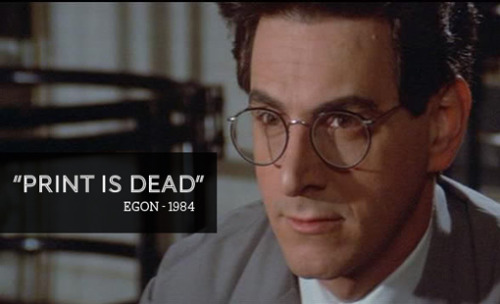
Posted on 01/07/2013 11:56:03 AM PST by Borges
Lovers of ink and paper, take heart. Reports of the death of the printed book may be exaggerated.
Ever since Amazon introduced its popular Kindle e-reader five years ago, pundits have assumed that the future of book publishing is digital. Opinions about the speed of the shift from page to screen have varied. But the consensus has been that digitization, having had its way with music and photographs and maps, would in due course have its way with books as well. By 2015, one media maven predicted a few years back, traditional books would be gone.
Half a decade into the e-book revolution, though, the prognosis for traditional books is suddenly looking brighter. Hardcover books are displaying surprising resiliency. The growth in e-book sales is slowing markedly. And purchases of e-readers are actually shrinking, as consumers opt instead for multipurpose tablets. It may be that e-books, rather than replacing printed books, will ultimately serve a role more like that of audio books—a complement to traditional reading, not a substitute.
(Excerpt) Read more at online.wsj.com ...
And though I love reading things on FR, when it comes to books and mags, give me the real thing.
But I love my hard copies better.
I do a lot of cross-referencing back into a book I currently read...not so much for novels but for non-fiction. I will never find this convenient with an e-reader.
However, I DO LOVE my e-reader for light reading, travel, and to have in my bag whenever I have a few minutes on a park bench to fill.
The present argument is that the buyer is only getting a license and that is not transferable to the estate. Ditto for if you store your photo's in some “cloud” server.
Like all the adverts for gold - nothing beats tangible assets.
I know I read differently on the computer than I do when I read a book.
My bottom shelf basic kindle is a great alternative.
I like being able to download books for free. I also like having a solution to the eternal problem of adequate lighting. However, I get sick of staring at screens all the time.
Also, why would you burn existing books? That’s just a stupid headline.
The reason books are better than e-books is because of bookstores. Here’s an experiment any reader can do: when you’re having a bad day go to a bookstore, on another bad day click on Amazon. There’s nothing like the feeling of walking into a bookstore, except maybe walking into a liquor store, just going in feels good. Amazon and other sources of e-books might be more convenient and cheaper, but they’ll never give you that high. I work across the street from a Barnes & Noble, it’s my primary work day stress relief.
Does anyone have a best recommendation for a basic cheap e-reader for borrowing library books?
My experience is that e-books work best for books you intend to read straight through from beginning to end, like a novel. Reference books and non-ficton books you know you will be referring to from time to time in the future don’t work so well and are better purchased as a traditional book.
One other reason may have to do with an issue that is rearing it’s legal head lately : who owns the media (iTunes/music, photographs, voice mail, eBooks etc) purchased on-line when the purchaser dies?
That is SO true. I have movies on Amazon Instant Video that I purchased and do wonder who will have these movies when not only I do but my wife as well. Will my children fight over them? Will my account be voided? Do I have to put this in the will? I know this seems simple at this point, but as electronic video libraries become more than a small amount of movies, books, music and suddenly becomes “money”...what happens????
I've read studies that indicate folks of my generation and older who were raised with books (personal desktops were just starting to come into widespread use during my college years), retain far more information when read off a printed page than we do reading of a monitor screen. That trend seems to be inverting itself with younger generations, as one might expect.
Why not just leave the password and access info to the relevant next of kin?
From my cold, dead ink smudged hands.
Print books cannot be deleted off my machine or updated to a more PC edition regardless of what I want. I can by a politically incorrect print edition and give it away anonymously - files are tracked.
Ray Bradbury poses the scenereo; All books are banned and the threat of losing knowledge becomes real.
People adept at memorizing, memorize passages or all of the classics and live in the forest, reciting what they know/remember.
Fast foeward to now ... and we are made aware of the re-writing of history and if no one remembers or keeps a copy or record of the original, in time we lose the past, no longer able to refence the past, ...
too horrible to imaging.

if you had to memorize a book, which would it be? i like to ask this question on Facebook every year on the anniversary of Ray Bradbury’s birthday...
i agree! no reason to burn existing books just because the trend is electronic... btw--i love my Nook, but i also love my hardcovers and even paperbacks...
With no hesitation, KJV of the Bible.
Disclaimer: Opinions posted on Free Republic are those of the individual posters and do not necessarily represent the opinion of Free Republic or its management. All materials posted herein are protected by copyright law and the exemption for fair use of copyrighted works.